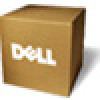Dell Broadcom NetXtreme Family of Adapters Broadcom NetXtreme 57XX User Guide - Page 54
Preparing the Image on the Local Hard Drive
 |
View all Dell Broadcom NetXtreme Family of Adapters manuals
Add to My Manuals
Save this manual to your list of manuals |
Page 54 highlights
IP Version: IPv6. (For IPv6, non-offload.) Windows HBA Boot Mode: Disabled 4. Select ESC to return to the Main menu. NOTE: Information on the Initiator Parameters and 1st Target Parameters screens are ignored and do not need to be cleared. 5. A second iSCSI boot adapter can be configured for redundancy in the event the primary adapter fails to boot. To configure the secondary device parameters, select Secondary Device Parameters from the Main menu (see Configure Parameters for a Secondary Adapter). Otherwise, go to step 12. 6. Select Exit and Save Configurations. Configure Parameters for a Secondary Adapter A second iSCSI boot adapter can be configured for redundancy in the event the primary adapter fails to boot. To configure the iSCSI boot parameters for a secondary adapter 1. From the MBA Configuration Menu, select CTRL+K. 2. From the Main menu, select Secondary Device Parameters. 3. From the Secondary Device Parameters screen, select Secondary Device. 4. From the Device List, select the adapter that will be used as the secondary adapter. 5. From the Secondary Device Parameters screen, set Use Independent Target Portal to Enabled (or Disabled if MPIO mode is not required) and set Use Independent Target Name to Enabled. 6. Select Invoke to configure the secondary adapter. 7. Configure the secondary adapter parameters. NOTE: The IP addresses for the primary and secondary adapters must be in two different subnets. 8. Select ESC and select Exit and Save Configuration. 9. Select F4 to save your MBA configuration. Preparing the Image on the Local Hard Drive When the software initiator mode operating system installation is used, the Windows operating system install must be performed in two stages. In the first stage, the OS is installed to a local hard drive on the system. In the second stage after the OS has been completely installed, an image of the local drive must be transferred to the iSCSI target for use in subsequent boots. Initial Windows Install 1. Install Windows 2003 32-bit or Windows 2003 64-bit OS on the local hard drive. 2. Install the Broadcom drivers using the Setup installer. NOTE: Do not install the drivers through Windows Plug-and-Play (PnP). Failure to install the drivers through the Setup installer might blue screen your system. 3. Install Microsoft iSCSI Software Initiator with integrated software boot support (version 2.06 or later). To download from Microsoft, go to http://www.microsoft.com/downloads/details.aspx?familyid=12cb3c1a-15d6-4585-b385befd1319f825&displaylang=en and locate the direct link for your system on the page's "Overview" section. 4. Select support for Multipath I/O (MPIO), if needed. Refer to Microsoft's Initiator documentation for more information on MPIO. 5. Select the iSCSI boot option. 6. Select the Broadcom adapter as the iSCSI boot device. NOTES: Do not manually create connections to the iSCSI target for iSCSI boot adapters. If the image is used on other hardware, Sysprep is required.















